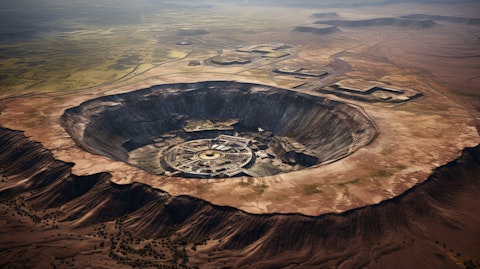In this article, we will look at the 7 Best Uranium Stocks To Buy According to Hedge Funds.
Uranium Market Outlook
According to a report by the World Nuclear Association, the uranium market is a complex and cyclical industry, with prices fluctuating based on demand and supply. In recent years, primary production from mines has supplied around 90% of the requirements of power utilities, with the remaining 10% coming from secondary sources such as ex-military material, recycling, and stockpiles. The demand for uranium is driven by the need for fuel to power nuclear reactors. There are currently around 440 reactors worldwide, with a combined capacity of around 390 GWe. These reactors require around 80,000 tonnes of uranium oxide concentrate each year, which contains around 67,500 tonnes of uranium.
The uranium supply comes from various sources, including mines, stockpiles, and secondary sources, such as recycled uranium and plutonium. In 2022, mines supplied around 58,201 tonnes of uranium oxide concentrate containing around 49,355 tU, around 74% of the utilities’ annual requirements. Secondary sources of uranium include recycled uranium and plutonium from used fuel, re-enriched depleted uranium tails, ex-military weapons-grade uranium, and civil stockpiles. These sources, such as mixed oxide (MOX) fuel, can be converted into usable fuel.
The demand for Uranium is expected to grow over the next decade. The World Nuclear Association’s Nuclear Fuel Report indicates a 28% increase in uranium demand over 2023-2033 and a 51% increase in uranium demand for 2031-2040. However, the uranium market faces several challenges, including the need for increased investment in new mines and infrastructure, as well as similar policies that give preferential to subsidized wind and solar sources. There are growth opportunities, particularly in nuclear energy, which is expected to play a key role in reducing carbon emissions and meeting increasing global energy demands.
Big Tech Investments in Nuclear Energy to Drive Sector Growth
In an interview on September 24 with CNBC, Amir Adnani, CEO of Uranium Energy, said that he is highly optimistic about the future of uranium investing. He believes that the uranium market is finally emerging from an 11-year bear market and is experiencing a renaissance. This newfound enthusiasm for uranium is driven by the growing recognition that nuclear power is crucial in the global effort to achieve carbon neutrality by 2050. As the world becomes increasingly aware of the need to reduce its reliance on fossil fuels and transition to cleaner forms of energy, nuclear power is being rediscovered as a vital part of the solution.
Adnani notes that public opinion polls are now at an all-time high in support of nuclear power, indicating a significant shift in the public’s perception of this form of energy. Furthermore, big tech companies are beginning to take notice of the potential of nuclear energy and are starting to partner with nuclear energy companies to invest in new infrastructure. This influx of capital and expertise is expected to have a profound impact on the industry, driving innovation and growth in the sector. The demand for nuclear-generated electricity is increasing exponentially, driven by the development of data centers and cloud computing. This surge in demand is causing U.S. utilities to extend the life of reactors and bring back previously retired reactors, which in turn is driving up the market for uranium.
However, Adnani also acknowledges concerns about the potential for big tech companies to drive up prices for households using power. This is a valid concern, as the increasing demand for nuclear-generated electricity could potentially lead to a supply shortage, driving up prices for consumers. Nevertheless, Adnani believes that this is a manageable risk and that the benefits of investing in uranium far outweigh the potential drawbacks. He notes that the utilities need to invest upward of $50 billion to keep up with the growing demand for nuclear-generated electricity, which presents a significant opportunity for investors.
The uranium market is expected to experience significant growth over the next decade due to the growing demand for nuclear energy and an increasing need for low-carbon energy sources. The uranium market is poised to play a critical role in meeting global energy demands. With that in context, let’s take a look at the 7 best uranium stocks to buy according to hedge funds.

An aerial shot of the uranium mines, demonstrating the company’s vast mineral resources.
Our Methodology
To compile our list of the 7 best uranium stocks to buy according to hedge funds, we used the Finviz and Yahoo stock screeners to find the 9 largest Uranium companies. We then narrowed our choices to 7 stocks according to their hedge fund sentiment, which was taken from our database of 912 elite hedge funds as of Q2 of 2024. The list is sorted in ascending order of their hedge fund sentiment, as of the second quarter.
Why do we care about what hedge funds do? The reason is simple: our research has shown that we can outperform the market by imitating the top stock picks of the best hedge funds. Our quarterly newsletter’s strategy selects 14 small-cap and large-cap stocks every quarter and has returned 275% since May 2014, beating its benchmark by 150 percentage points (see more details here).
7 Best Uranium Stocks To Buy According to Hedge Funds
7. Centrus Energy (NYSE:LEU)
Number of Hedge Fund Investors: 9
Centrus Energy (NYSE:LEU) is a leading nuclear fuel supplier that provides critical fuel for nuclear power plants and is developing the next generation of centrifuge technologies. The company produces enriched uranium for both commercial and government applications. Centrus Energy (NYSE:LEU) is the only company in the United States licensed to produce 20% enriched uranium.
The US government has set aside $3.4 billion to support the production of nuclear fuel in the United States. Centrus Energy (NYSE:LEU), being a US company, is competing for federal funding under a series of Requests for Proposals (RFPs) issued by the U.S. Department of Energy. On September 24, management highlighted the importance of American-made technology and jobs, which aligns with the interests of policymakers of Capitol Hill. The company’s CEO, Amir Vexler, made a strong case for investing in American enrichment technology, which suggests that Centrus Energy (NYSE:LEU) may secure funding.
On September 11, Centrus Energy (NYSE:LEU), signed a contingent supply commitment with Korea Hydro & Nuclear Power (KHNP) to support the construction of new uranium enrichment capacity at the company’s Centrifuge Plant in Piketon, Ohio. This commitment, which is valued at $1.8 billion, covers a decade of deliveries of Low-Enriched Uranium (LEU) to help fuel Korea’s large number of reactors. Centrus Energy (NYSE:LEU) has already secured $1.8 billion in contingent sales commitments from KHNP to support the deployment of new capacity.
Centrus Energy’s (NYSE:LEU) Piketon site in Ohio has the capacity to produce up to 5 million SWU of enriched uranium, which is a significant increase from the company’s current production levels. Centrus Energy (NYSE:LEU) plans to scale up its production facility on a modular basis, enabling it to meet the growing demand for its products.
According to the International Energy Agency (IEA), global nuclear electricity generation is forecast to hit an all-time high in 2025, with nuclear energy combined with renewable energy predicted to overtake coal-fired generation for the first time in 2026. This growing demand for nuclear energy will drive the need for a reliable domestic supply of enriched uranium. Centrus Energy (NYSE:LEU) is a compelling investment opportunity driven by growing demand for nuclear energy and government support. In the second quarter, the company’s stock was held by 9 hedge funds with stakes worth $26.60 million.
6. Energy Fuels (NYSE:UUUU)
Number of Hedge Fund Investors: 11
Energy Fuels (NYSE:UUUU) is a Canadian company that is engaged in the extraction, recovery, and processing of uranium, vanadium, and rare earth elements (REEs). The company has a diverse portfolio of assets in the United States including the White Mesa Mill in Utah, the Nichols Ranch ISR Project in Wyoming, and the La Sal Complex in Utah.
Energy Fuels’ (NYSE:UUUU) uranium segment represents 88% of its revenue, and it has a strong pipeline of projects, including the Pinyon Plain, La Sal, and Pandora mines, which are expected to ramp up production by the end of this year. Additionally, the company is making progress with the permits for the Whirlwind and Nichols Ranch mines, which could increase its uranium production to over two million pounds per year by 2025. The recent geopolitical tailwinds in the US, including the approval of the Prohibiting Russian Uranium Imports Act, are expected to drive up uranium prices, making Energy Fuels well-positioned to capitalize on this trend.
The company’s REE segment is also expected to drive growth with the completion of phase 2 and phase 3 expansion plans at the White Mesa Mill. The phase 2 expansion is expected to increase the company’s NdPr production to 4,000-6,000 tonnes per year, a 29x improvement from the current production levels. The company has no debt and healthy liquidity, including $146.7 million in marketable securities and $30.4 million in inventories, which provides a solid foundation for the company’s growth plans.
The company is well-positioned to capitalize on the growing demand for uranium and REEs, driven by the increasing adoption of electric vehicles and renewable energy technologies. In the second quarter, Energy Fuels’ (NYSE:UUUU) stock was held by 11 hedge funds with stakes worth $25.84 million. Bridgewater Associates is the largest shareholder in the company with a stake worth $9.22 million as of June 30.





